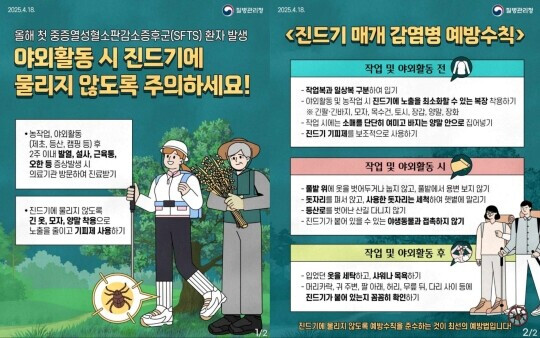
DAEJEON, South Korea – As the outdoor activity season fully kicks off, Daejeon City is urging its citizens to take extra precautions to prevent tick-borne diseases like Severe Fever with Thrombocytopenia Syndrome (SFTS). With no available vaccine or specific treatment for SFTS, the city emphasizes that the best prevention is to avoid tick bites altogether.
SFTS: A Highly Fatal Tick-Borne Disease
SFTS is primarily transmitted through bites from hard ticks carrying the SFTS virus, typically between April and November. The incidence of the disease increases during the spring when outdoor activities become more frequent. Initial symptoms include fever, vomiting, diarrhea, and fatigue. However, in severe cases, it can progress to thrombocytopenia and multiple organ failure, making it a highly fatal illness. Tragically, Daejeon recently reported a case where a man in his 50s, who was working in agriculture, died after his SFTS symptoms worsened. Over the past five years, Daejeon has recorded two SFTS-related deaths, and the national fatality rate stands at approximately 18.5%, classifying it as a very dangerous disease.
Strict Adherence to Tick Prevention Measures During Outdoor Activities Required
Daejeon City stresses the importance of strictly observing the following prevention guidelines during outdoor activities with a high risk of tick exposure, such as farm work, hiking, weeding, golfing, and collecting wild edibles:
Minimize Skin Exposure: When outdoors, wear long-sleeved shirts, long pants, socks, and hats to minimize exposed skin.
Use Tick Repellents: Apply tick repellents to clothing and exposed skin to deter ticks.
Avoid Grassy Areas: Refrain from sitting directly on grass or leaving clothes on grassy areas, as this increases the risk of tick exposure.
Post-Activity Check: Immediately wash clothes after returning home and take a shower, carefully checking for any insect bites or ticks attached to the body.
Seek Medical Attention for Suspected Symptoms: If symptoms such as a high fever (38 degrees Celsius or higher), vomiting, or diarrhea appear within two weeks after outdoor activities, visit a medical institution immediately for diagnosis and treatment.
Jeong Tae-young, Director of Daejeon City's Sports and Health Bureau, stated, "SFTS has a high probability of worsening into a severe condition once infected, and since there is no vaccine or specific treatment yet, prevention is the best approach." He added, "Especially high-risk groups such as the elderly in rural areas and outdoor workers must thoroughly practice prevention guidelines during outdoor activities and seek prompt medical attention if symptoms are suspected." The city hopes for active cooperation from its citizens to prevent the spread of SFTS and ensure a healthy summer.
[Copyright (c) Global Economic Times. All Rights Reserved.]






























